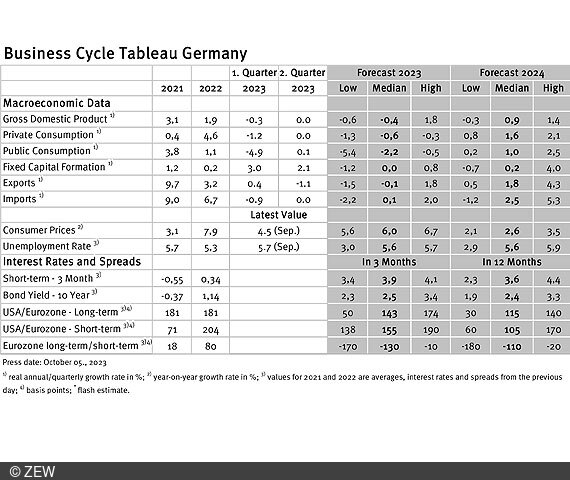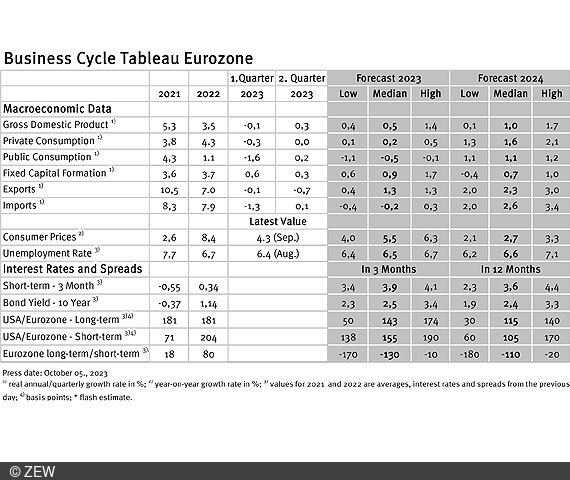Gloomy Outlook
Business Cycle Tableaus by ZEW and Börsen-ZeitungEconomic Experts Lower GDP Forecast for Germany and the Eurozone
Economic analysts are once again looking at the trajectory of the German economy with less optimism, revising growth forecasts downward for both the current and next year. The eurozone’s economic outlook is also expected to be slightly less favourable than assumed in the previous month. On a positive note, inflation is notably on the decline. These are the results of the business cycle tableaus by ZEW Mannheim and the German daily newspaper, Börsen-Zeitung.
The quarterly growth figures for Germany’s real gross domestic product (GDP) remain consistent with September, reflecting a contraction of 0.3 per cent in the first quarter and zero growth in the second quarter. Experts are expressing slightly greater pessimism compared to the previous month. Presently, their projections indicate a 0.4 per cent decline in Germany’s real GDP for 2023 (a 0.1 percentage point decrease from September) and a 0.9 per cent increase for 2024 (a 0.3 percentage point reduction).
Confidence in the eurozone also diminishing
The quarterly growth figures for the eurozone also remain unchanged, persisting at -0.1 per cent for the first quarter and 0.3 per cent for the second quarter. Consequently, economic growth in the eurozone continues to slightly outpace that of Germany. In line with the German forecasts, expectations for eurozone growth are marginally less optimistic than in September. The growth forecast for 2023 is revised downwards by 0.2 percentage points to 0.5 per cent, while the forecast for 2024 sees an upward adjustment of 0.3 percentage points, now standing at 1.0 per cent.
A comparative analysis of GDP forecasts for Germany and the eurozone reveals that Germany is projected to further lag behind the rest of the eurozone in 2023. However, experts anticipate a similar recovery for both Germany and the eurozone in 2024.
Inflation subsides
Both Germany and the eurozone are witnessing notable declines in inflation rates compared to the previous month. In September, inflation rates were at 4.5 per cent for Germany and 4.3 per cent for the eurozone. Projections for the entire year continue to anticipate inflation rates of 6.0 per cent for Germany and 5.5 per cent for the eurozone. Looking ahead to 2024, experts now project inflation rates of 2.6 per cent for Germany and 2.7 per cent for the eurozone, each downwardly revised by 0.1 percentage points from September. These minimal differences suggest a gradual return of inflation rates towards the European Central Bank’s target in the long run.
Few indications of monetary policy easing
Monetary policy expectations have held relatively steady since September, except for a 0.2 percentage point downward revision in short-term interest rate expectations for 2023. Consequently, there are few indications of a short to medium-term easing in monetary policy.
Business Cycle Tableaus by ZEW and Börsen-Zeitung
In cooperation with Börsen-Zeitung, ZEW has been publishing monthly business cycle tableaus for Germany and the eurozone with economic key figures and forecasts since 2013. Numerous banks and institutes publish reports on the current and prospective economic situation at different intervals. The information relevant for the tableau is filtered out of these publications to compute a median, minimum and maximum of the available forecasts for the current and subsequent year.
The monthly tableaus show current GDP forecasts, its main components, consumer prices, industrial production, unemployment rate, short- and long-term interest rates, and interest rate spreads. The focus of the tableaus lies on national business cycle reports, which are complemented with forecasts from international banks and institutes. The tableau for the eurozone is enhanced by data from European banks and institutes.

